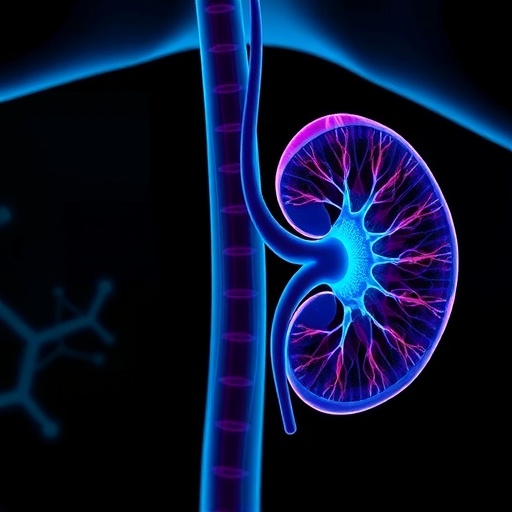In a groundbreaking study poised to disrupt our understanding of kidney health, researchers have unveiled the potent effects of geniposide, a natural compound extracted from the fruit of the gardenia plant. This study, set to be published in BMC Complementary Medicine and Therapies, sheds light on how geniposide can play a critical role in alleviating kidney fibrosis—a condition that has long been associated with significant morbidity and mortality rates globally. Such insights are crucial as they open new dimensions to the treatment of chronic kidney disease, which affects millions around the world.
The investigative team led by Shi et al. delved deeply into the molecular mechanisms by which geniposide expresses its therapeutic properties. The focus of their investigation was on the STAT3-HK2 pathway, a critical signaling route that regulates cellular glycolysis and metabolic control in renal fibrosis. By obstructing this pathway, geniposide demonstrated impressive capabilities in mitigating the fibrotic process, which is characterized by excessive accumulation of extracellular matrix components that lead to scarring and eventual organ failure.
Kidney fibrosis is not merely a consequence of advanced kidney disease but a progressively worsening condition that can develop even in the early stages of renal impairment. The study emphasizes that treating the underlying processes of fibrosis can potentially prevent the deterioration of kidney function. Geniposide appears to intervene at the cellular level, targeting pathways that, when left unregulated, contribute to fibrosis. The implications of this are profound, as it could transform the current approach to managing kidney illnesses.
The researchers employed a series of robust in vitro and in vivo experiments to underscore the efficacy of geniposide against renal fibrosis. Using various cell lines and animal models, the study illustrated how geniposide inhibited the activation of renal fibroblasts, the cells primarily responsible for producing fibrogenic markers in the kidney. This remarkable ability marks geniposide as a key player in transforming how we think about renal protection from fibrotic damage.
Importantly, the research indicates that geniposide enhances the apoptosis of fibroblasts while preserving renal tubular epithelial cells, thereby retaining their functionality. The dual action of inducing cell death in harmful fibroblasts while offering protection to essential epithelial cells presents a novel therapeutic strategy. This intricate balance might be the key to fostering a healthier kidney environment and preventing further damage.
In your typical understanding of pharmacology, the translation of findings from basic science into clinical application is often fraught with challenges. However, the current findings regarding geniposide offer a clear pathway. Given its natural origins, geniposide may present fewer side effects compared to synthetic drugs. This opens up exciting avenues for its application not only in kidney disease but also in various forms of organ fibrosis.
The research community has long acknowledged the role of metabolic dysregulation in renal fibrosis, but the detailed connection elucidated by Shi et al. puts forth a compelling narrative that links metabolic pathways directly to the pathophysiology of kidney damage. The disruption of the STAT3-HK2 signaling cascade introduces the potential for targeted therapies that might not only ameliorate symptoms but also reverse progression in renal fibrosis cases.
These findings have significant implications for future research directions. They suggest a possible shift in focus towards the development of geniposide-based therapies that can be administered to patients at the early signs of kidney dysfunction. Furthermore, optimizing the bioavailability and efficacy of geniposide could lead to enhanced therapeutic regimens that benefit patients significantly.
The results of this study resonate with a broader clinical imperative—the need for effective, low-cost interventions that can ease the burden of chronic kidney disease on healthcare systems worldwide. With the prevalence of renal impairment rising alarmingly, innovative solutions are required to alter the trajectory of this global health issue. The findings from this research illuminate a viable pathway through the multifaceted roles played by natural compounds like geniposide.
Moreover, the rigorous nature of the scientific inquiry is demonstrated in the study’s methodological design. The researchers implemented comprehensive statistical analyses to ensure the validity and reproducibility of their results. This meticulous approach provides a robust framework for both current and future studies exploring the pharmacological benefits of geniposide and similar compounds.
As we move forward, it is essential for the scientific community and public health policymakers to advocate for intensified research into natural products that can yield transformative health benefits. The systemic integration of findings from studies such as this one can reformulate treatment strategies, shifting the paradigm towards a more holistic, prevention-oriented approach to kidney disease management.
In summary, the research led by Shi et al. marks an important milestone in our understanding of kidney fibrosis and its treatment. With a focus on the STAT3-HK2 pathway and geniposide’s multifaceted action, this study not only paves the way for innovative therapeutic strategies but also enhances our comprehension of kidney pathology. The promise shown by geniposide stands as a testament to the potential of harnessing nature’s pharmacy in the fight against chronic diseases.
The call to action is clear: as the evidence accumulates, the integration of compounds like geniposide into clinical practice could soon transition from experimental to therapeutic reality, promising hope for millions affected by kidney fibrosis and related diseases.
Subject of Research: Effects of Geniposide on Kidney Fibrosis
Article Title: Geniposide alleviates kidney fibrosis by targeting STAT3-HK2-mediated glycolysis
Article References:
Shi, R., Liu, Mq., Xiao, Jp. et al. Geniposide alleviates kidney fibrosis by targeting STAT3-HK2-mediated glycolysis. BMC Complement Med Ther 25, 365 (2025). https://doi.org/10.1186/s12906-025-05102-7
Image Credits: AI Generated
DOI: 10.1186/s12906-025-05102-7
Keywords: Geniposide, Kidney Fibrosis, STAT3-HK2 Pathway, Natural Compounds, Chronic Kidney Disease




